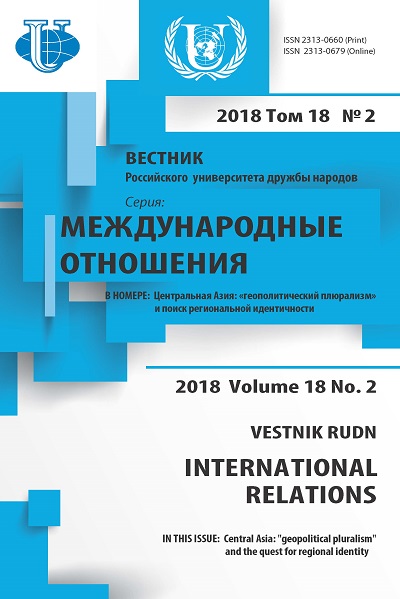REFORMS IN UZBEKISTAN’S FOREIGN POLICY: MAJOR ACHIEVEMENTS AND DEVELOPMENT SCENARIOS
- Authors: Kazantsev A.A.1, Gusev L.Y.1
-
Affiliations:
- Moscow State Institute of International Relations (MGIMO-University)
- Issue: Vol 18, No 2 (2018): Central Asia: “geopolitical pluralism” and the quest for regional identity
- Pages: 292-303
- Section: THEMATIC DOSSIER
- URL: https://journals.rudn.ru/international-relations/article/view/18881
- DOI: https://doi.org/10.22363/2313-0660-2018-18-2-292-303
- ID: 18881
Cite item
Full Text
Abstract
The actual, still little explored topic of the reforms of the new president of the Republic of Uzbekistan Sh. Merzieev is considered in the paper. It is noted that the study of these reforms and the prospects for the development of the situation in Uzbekistan are extremely important from the point of view of the interests of all countries of the post-Soviet space, because Uzbekistan is strategically located and has the largest population of Central Asia. The migration processes that bind Russia and Uzbekistan and the existence of a common terrorist threat show our country's serious interest in maintaining stability in the neighboring state. The aim of the work is to provide an analysis of reforms in the country's foreign policy. Scientific works and expert opinions devoted to the situation, both in Uzbekistan and in the Central Asian region are used in the article. Among them there are the works of MGIMO staff (Sergeyev V.M., Sodikov S.D., Mehdiyev E.T.), Russian International Affairs Council (Alekseyenkova E.S.), Institute for Socio-Political Studies of RAS (Seleznev I.A.), Information Analytical Center of MSU (Vlasov A.V., Karavaev A.V.). In addition, press materials in Uzbek and Russian were used. In conclusion, it is pointed out that the President of Uzbekistan initiated a large-scale series of reforms, which can already be called a “thaw”. In foreign policy Tashkent managed to improve relations seriously with all its neighbors in the region, as well as with Russia and Western countries. The authors formulated three scenarios for the further development of the situation in the country.
Keywords
About the authors
Andrey Anatolievich Kazantsev
Moscow State Institute of International Relations (MGIMO-University)
Author for correspondence.
Email: andrka@mail.ru
Doctor of Political Science, Director of the Center for Central Asian and Afghan Studies, Leading Researcher of the Institute for International Studies of the Moscow State Institute of International Relations (MGIMO-University)
Leonid Yuryevich Gusev
Moscow State Institute of International Relations (MGIMO-University)
Email: lgoussev@yandex.ru
PhD in History, Senior Researcher of the Center for Central Asian and Afghan Studies of the Institute for International Studies of the Moscow State Institute of International Relations (MGIMO-University)
References
- Bespalov, S.V., Vlasov, A.V., Golubtsov, P.V., Kazantsev, A.A., Karavaev, A.V. & Merkushev, V.N. (2007). Mechanisms for the formation of a positive image of Russia in the countries of the postSoviet space. Moscow: The Eurasian Network of Political Studies, Information and Analytical Center for the Study of Social and Political Processes in the Post-Soviet Space (Moscow State University). (In Russ.).
- Gusev, L.Yu. (2005). Russia — Central Asia: the prospects for relations. Observer, 12 (191), 64—68. (In Russ.).
- Gusev, L.Yu. (2013).Water-energy problems of Central Asia and possible ways of their solution. Vestnik MGIMO University, 6 (33), 34—41. (In Russ.).
- Gusev, L.Yu., Kazantsev A.A. (2015). Russian-Kazakh relations: problems and prospects. The Journal “Administrative Consultation”, 1 (73), 29—40. (In Russ.).
- Kazantsev, A.A. (2005). Central Asia: The institutional structure of international interactions in the emerging region. Polis. Political studies, 2, 78—88. (In Russ.).
- Seleznev, I.A. (2016). The role of institutional structures in the process of Eurasian integration. Socio-humanitarian knowledge, 6, 209—219. (In Russ.).
- Seleznev, I.A. (2017). The Role of the CSTO and the SCO in Securing the Security of the Countries of Central Asia. Socio-humanitarian knowledge, 4, 143—152. (In Russ.).
- Sergeev, V.M., Kuz’min, A.S., Alekseenkova, E.S. & Kazantsev, A.A. (2007). Moscow and St. Petersburg as centers of attraction of social networks. Polis. Political studies, 2, 31—43. (In Russ.).
- Sergeev, V.M., Kuz'min, A.S., Nechaev, V.D., Alekseenkova, E.S., Kazantsev, A.A. & others (2007). The choir of the Moscow gates and scenarios of its development. Polis. Political studies,2, 44—62. (In Russ.).
- Sodikov, S.D., Mehdiyev, E.T. (2017). Prospects for the development of the EAEC and the EU. Competitiveness in the global world: economy, science, technology, 5-3 (45), 139—142. (In Russ.).
Supplementary files










